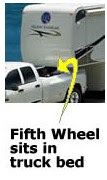We install everything we sell at Auto Truck Depot. Most of the time, we do it for the convenience factor. People just don’t have the time or inclination to install these products at home. However, some do. We have a lot of customers who are very hands on and do-it-yourself. DIY is great because it cuts costs for you. Although we certainly want your business, if you told our sales staff that you want to install your truck box yourself we’re not going to be broken-hearted. Installing a truck box, however, is a bit different than installing an item that is considered a “safety feature”. Brake controllers are safety mechanisms. While there are a great many people out there that are meticulous and handy, it is still a good idea to have a professional team install any item that involves safety. If you scratch your truck installing a truck box, you’ve done cosmetic damage. If your brake controllers fail, you have a potential accident on your hands.
Since the mid 90’s manufacturers of RVs, trucks, and SUVs have all made allowances for trailers and are set up to use an electronic trailer brake controller. Most of them now have brake controller units built right in, but some have what is called a “quick plug” on the dash somewhere that connects up to the standard brake controller. This does make things a lot easier and there are customers that I know who I would sell a brake controller to with good conscience because I know that they will be just fine connecting the brake controller quick plug to their vehicle.
With older vehicles and trailers this process is not quite as cut and dry. Someone would have to be good at wiring to create the connection between the trailer brakes and the vehicle’s own braking unit. This means tapping into the brake light wiring, finding the brake light switch and running a 12 volt power wire, ground wire, and brake light wire to the controller and then back to the trailer’s brake wiring connector. This isn’t rocket science—what is besides rocket science? Still…I’d feel a lot better if I knew that someone who does this daily or weekly is handling it. I can’t tell you how many times I’ve driven behind a trailer whose brake lights don’t work.
That concludes my rant of the day on brake controllers.


